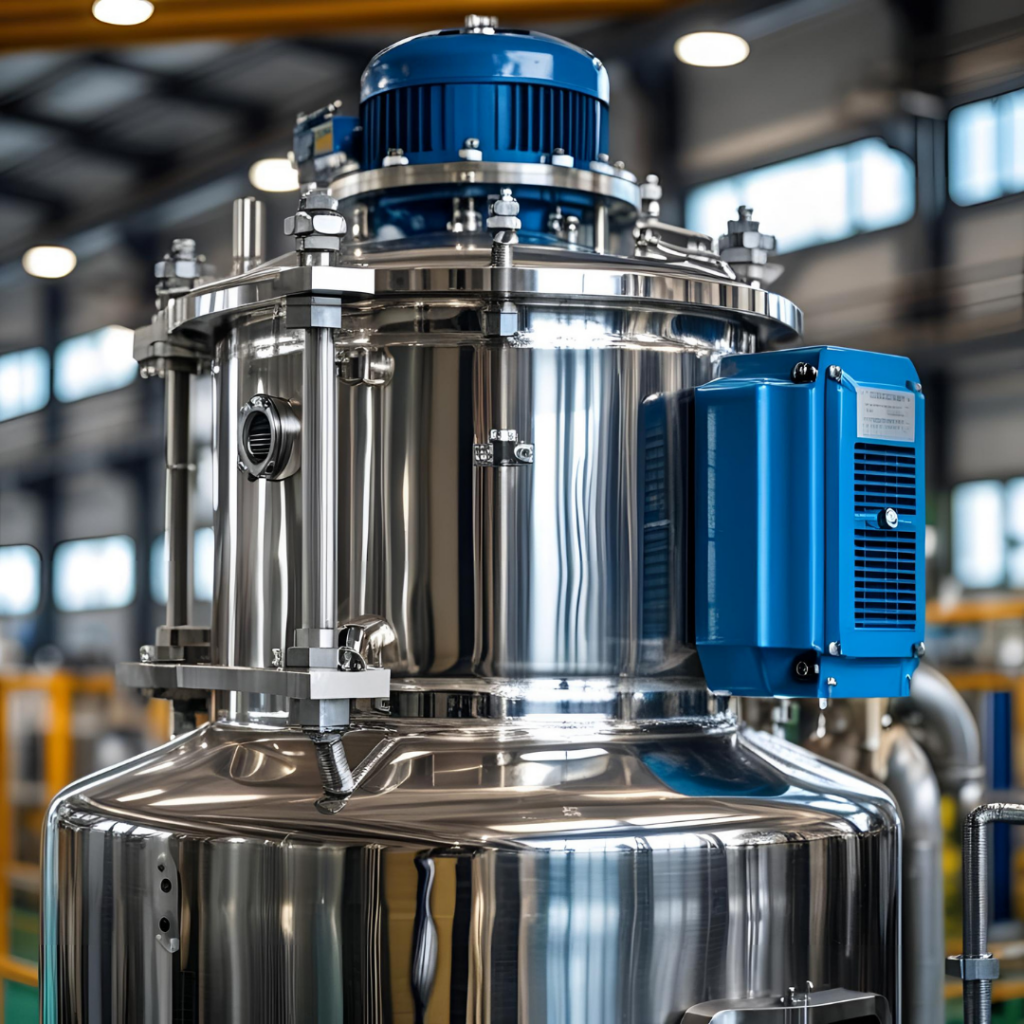Paslanmaz Reaktör İmalatı Nedir?
Paslanmaz reaktörler, kimyasal reaksiyonların kontrollü şekilde gerçekleştiği, genellikle endüstriyel tesislerde kullanılan özel tasarımlı ekipmanlardır. Bu reaktörler; yüksek sıcaklık, basınç ve korozyona dayanıklı olmaları sebebiyle paslanmaz çelikten üretilir. İmalat süreci ise teknik bilgi, hassas mühendislik ve deneyim gerektirir.
Reaktör Tanımı ve Genel Kullanım Alanları
Reaktörler, bir veya birden fazla maddenin fiziksel ya da kimyasal reaksiyona girdiği sistemlerdir. Kimya, gıda, ilaç, kozmetik ve biyoteknoloji sektörlerinde vazgeçilmezdir. Bu sistemlerde ısıtma, soğutma, karıştırma gibi birçok işlem aynı anda yapılır.
Paslanmaz Malzemenin Tercih Edilme Sebepleri
Paslanmaz çelik, dayanıklılığı, hijyenik yapısı ve uzun ömrü sayesinde reaktör imalatında en çok tercih edilen malzemedir. Ayrıca paslanmaz çeliğin paslanmaya karşı direnci, düşük bakım maliyeti ve estetik görünümü de önemli avantajlar sunar.
Paslanmaz Reaktörlerin Sınıflandırılması
Tek Cidarlı ve Çift Cidarlı Reaktörler
Tek cidarlı reaktörler basit uygulamalar için yeterlidir. Ancak sıcaklık kontrolünün önemli olduğu işlemlerde çift cidarlı modeller tercih edilir. Çift cidar sayesinde içine ısı transfer sıvısı verilebilir.
Karıştırıcılı Reaktörler
Karıştırıcılar, homojen karışım sağlamak ve reaksiyon verimini artırmak için kritik öneme sahiptir. Motor gücü ve pervane tipi, işlemin doğasına göre belirlenir.
Isıtmalı ve Soğutmalı Reaktörler
Bazı kimyasal reaksiyonlar için sıcaklığın kontrol edilmesi gerekir. Bu durumda reaktör cidarına entegre edilen ısıtma/soğutma sistemleri devreye girer.
Paslanmaz Reaktör İmalat Süreci
Mühendislik Tasarımı ve Projelendirme
İmalat süreci, detaylı mühendislik çalışmaları ile başlar. İhtiyaca uygun kapasite, basınç değerleri ve tasarım özellikleri belirlenir.
Kullanılacak Malzeme Seçimi
Genellikle AISI 304 veya 316 kalite paslanmaz çelik kullanılır. Aşındırıcı ortamlarda 316L kalite çelik tercih edilir.
CAD/CAM Yazılım Kullanımı
Tasarım aşamasında 3D modelleme yazılımlarıyla tüm detaylar önceden planlanır. Bu sayede üretim sırasında hata riski minimize edilir.
Üretim Süreci Aşamaları
Lazer Kesim ve Büküm
Malzemeler yüksek hassasiyetle kesilir ve istenen forma bükülür.
Kaynak ve Montaj Süreci
Parçalar TIG/MIG kaynak teknolojileriyle birleştirilir. Hijyenik kaynak uygulamaları, yüzey pürüzsüzlüğü açısından oldukça önemlidir.
Yüzey İşlemleri ve Temizlik
Asitleme ve Pasivasyon
Yüzeydeki kaynak artıkları ve oksit tabakaları, asitle temizlenir ve paslanmaya karşı direnç artırılır.
Kalite Kontrol ve Test Süreçleri
Sızdırmazlık Testleri
Sıvı ve gaz kaçaklarına karşı yapılan testlerle reaktörün güvenliği sağlanır.
Basınç Testleri ve Güvenlik Kontrolleri
İmalat sonrası reaktör, belirtilen basınç değerlerinde test edilir. Bu testler, ürünün güvenli ve uzun ömürlü olmasını garanti eder.
Asinoks Kalitesiyle Paslanmaz Reaktör İmalatı
Asinoks’un İmalattaki Tecrübesi ve Referansları
Asinoks, yılların tecrübesiyle Türkiye’nin dört bir yanında endüstriyel firmalara özel reaktör çözümleri sunar. Kalite, müşteri memnuniyeti ve mühendislik prensipleriyle fark yaratır.
Kullanıcıya Özel Tasarımlar
Her sektör farklıdır; Asinoks da her projeye özel çözüm sunar. İhtiyacınıza uygun, size özel bir reaktör tasarlıyoruz.
Uluslararası Standartlara Uygunluk
ASME, CE ve ISO standartlarına uygun üretim sayesinde, güvenli ve belgeli ürünler teslim edilir.
Sektörel Uygulama Alanları
Kimya Sanayi
Asit, baz, solvent gibi agresif maddelerin karıştırılması için paslanmaz reaktörler idealdir.
Gıda ve İçecek Endüstrisi
Hijyenin ön planda olduğu bu sektörde, paslanmaz reaktörler süt, meyve suyu, şeker şurubu gibi ürünlerin üretiminde kullanılır.
İlaç ve Kozmetik Üretimi
Steril ortam gerektiren bu alanlarda paslanmazlık ve hijyenik tasarım büyük önem taşır.
Paslanmaz Reaktörlerde Bakım ve Dayanıklılık
Korozyona Karşı Dayanıklılık
Paslanmaz çelik, kimyasal maddelere karşı yüksek direnç gösterir. Bu da cihazın ömrünü uzatır.
Temizlik ve Hijyen Kolaylığı
Pürüzsüz yüzey yapısı sayesinde kolay temizlenebilir ve bakteriyel oluşum önlenir.
Reaktör Seçerken Nelere Dikkat Edilmeli?
Kapasite ve Basınç Değerleri
İşlem hacmi ve çalışılacak basınç seviyesi doğru seçilmelidir.
Karıştırıcı Tipi ve Motor Gücü
Karışımın yoğunluğu ve işlem süresi, bu parametreleri etkiler.
Sertifikasyonlar ve Belgeler
ASME, CE, ISO belgelerine sahip ürünler her zaman tercih sebebidir.
Sürdürülebilirlik ve Çevre Duyarlılığı
Geri Dönüştürülebilir Malzeme Kullanımı
Paslanmaz çelik %100 geri dönüştürülebilir bir malzemedir.
Enerji Verimliliği Sağlayan Tasarımlar
Yalıtımlı gövdeler ve verimli karıştırıcılar enerji tüketimini azaltır.
Maliyetlendirme Süreci
Fiyatı Etkileyen Unsurlar
Kapasite, cidar yapısı, motor gücü ve ek donanımlar maliyeti etkiler.
Uzun Vadede Sağladığı Ekonomik Avantajlar
Düşük bakım maliyeti ve uzun ömrü sayesinde toplam maliyet düşer.
Sık Yapılan Hatalar ve Dikkat Edilmesi Gerekenler
Ucuz ve Standart Dışı Malzeme Kullanımı
İlk yatırım düşük olsa da ileride ciddi sorunlara yol açar.
Denetimsiz Üretim Süreçleri
Sertifikasız ve kontrolsüz ürünler, işletme güvenliği açısından büyük risk taşır.
Asinoks ile İletişim Kurun
Asinoks olarak her ihtiyacınıza özel reaktörleri tasarlamaktan memnuniyet duyarız. Bizimle iletişime geçin, sizin için en uygun çözümü birlikte üretelim.
Sonuç
Paslanmaz reaktör imalatı, ileri mühendislik ve yüksek kalite gerektiren bir süreçtir. Asinoks, hem yerli hem global ölçekte güvenilir çözümler sunar. Dayanıklı, hijyenik ve ekonomik reaktörler için siz de Asinoks’un deneyimine güvenin.
Sıkça Sorulan Sorular (FAQ)
- Paslanmaz reaktör nedir, ne işe yarar?
Paslanmaz reaktörler, kimyasal reaksiyonları güvenli ve kontrollü bir şekilde gerçekleştirmek için kullanılır. - Hangi kalite paslanmaz çelikler kullanılır?
Genellikle AISI 304, 316 ve 316L kalite paslanmaz çelikler tercih edilir. - Asinoks reaktörleri uluslararası belgelere sahip mi?
Evet, CE, ISO ve ASME gibi uluslararası kalite belgelerine sahiptir. - Paslanmaz reaktörlerin ömrü ne kadardır?
Kullanıma ve bakıma bağlı olarak 20 yıl ve üzeri kullanım ömrüne sahiptirler. - Reaktör fiyatları nasıl belirlenir?
Kapasite, cidar yapısı, motor gücü gibi teknik özellikler fiyatı belirler.


